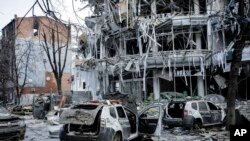During their first attempt to rescue a group of orphans in eastern Ukraine, the shelling was so intense the battle-hardened former U.S. combat veterans had to give up.
“We had to put them back in the shelter and come back 48 hours later. And then we got them, in the meantime, three of their teachers had been killed,” former Green Beret Jeremy Locke told VOA in an interview in Poland shortly before he was heading back in on another mercy dash to guide orphans in eastern and southern Ukraine to safety.
Locke is the chief of operations for Aerial Recovery, a team of former U.S. military veterans. They are working with Ukraine’s Defense Ministry and Salam, a charity which helps refugees, to evacuate orphans from hot spots. So far they have evacuated 478 orphans and reckon they have at least another thousand to go.
“But the numbers will change depending how the war unfolds,” Locke, who was born in Oregon, says. He is a giant of a man, neatly bearded and fit-looking. But despite his height and the soldierly bearing of his team, few people have been noticing either him or his team as they come and go from the hotel they are basing out of in Warsaw, Poland. They are discreet, quiet, soft-footed and unassuming.
Locke, who last saw service as a Green Beret in northern Syria, talks matter-of-factly about what his team has been doing and what they have seen in Ukraine. But his eyes darken when he said: “I've been in combat five years of my life, and it is no place for a kid. It is not even a place for an adult.”
He says the kids they rescue are in varying physical and emotional shape when they reach them. “It depends on where they come from,” he says.
“One group of kids we brought out, they had been in a shelter or in a cellar for about a week, and it took us two attempts to get them. The first attempt, the shelling, was just too bad. We had to put them back in the shelter and come back 48 hours later. And in the meantime three of their teachers were killed, so they were in pretty bad shape. They were hungry and cold and tired, and they were very quiet. They were in shock,” he explained.
He says he feels terrible when he has to leave the kids and go back later when it is safer to load them up on buses and trucks and get them out. “We do have a responsibility to make sure they are not hurt or killed when we move them,” he says.
“At least if they are inside a bunker or whatever, and there is shelling or whatever happening above them, they are in relative safety. They may not have much food and all that stuff, but we have to be sure when we go get them that we're not taking them out of a place of safety and putting them in harm's way. So that's what is really difficult about the job,” he says.
Aerial Recovery has been working with Salam and local Ukrainian and Polish authorities to try to ensure any orphans who are relocated will be safe and not prey for traffickers. There have been fears the kids could be lost track of, or that smuggling gangs might snatch them. There have been some unverified reports that some Ukrainian men may have kidnapped displaced kids to help them leave Ukraine. All 18-60 year-old men are required to remain in the country in case they need to be conscripted, one waiver, though, is if they have three young children.
In a speech earlier this month, the EU Commissioner for Home Affairs, Ylva Johansson, said she had been receiving “some reports of criminals taking orphans from orphanages in Ukraine, crossing the border pretending that they are relatives to the child and then using them for trafficking purposes.” Ukrainian and Polish authorities have been endeavoring to ensure there are clear paper trails for evacuated and parentless kids.
Locke says at first most NGOs were planning for the kids to be moved across the border into Poland, but that has shifted with most kids placed in safety and now sheltered in western Ukraine — with the effort being overseen by the child services department of Lviv’s local government. But some children are being moved into east Poland with the Ukrainian authorities establishing procedures with NGOs to process displaced kids.
The average age of the orphans Locke’s team has been evacuating is “about 10 years-old and under, but I would say the majority of them are between 13 and 14 years-old,” he says. His team of nearly two dozen has medical support. “A lot of our guys are former Special Forces medics and combat medics. And we have medical equipment we keep with us,” he says.
“And then when we arrive at our destination near Lviv, we screen them and a lot of them are sick with respiratory ailments. One of the kids we brought out had AIDS. We have had a few with diabetes. But we sometimes know what their medical needs are before we even get to them. We have insulin with us or whatever we need.”
'No Place for a Kid,' says US Veteran Who’s Rescuing Ukraine’s Orphans

Warsaw —



